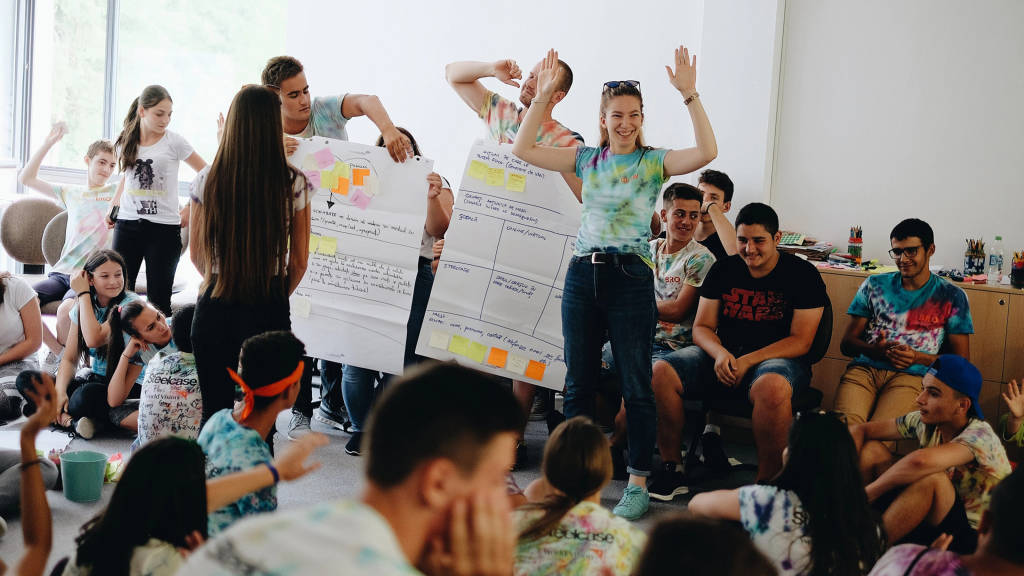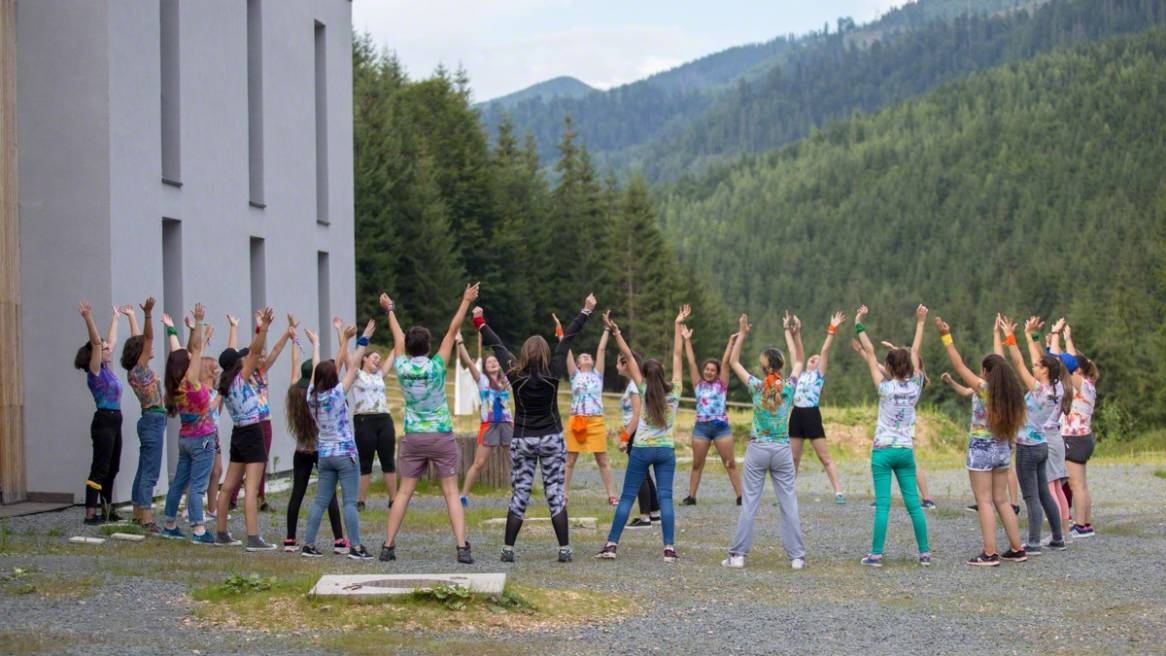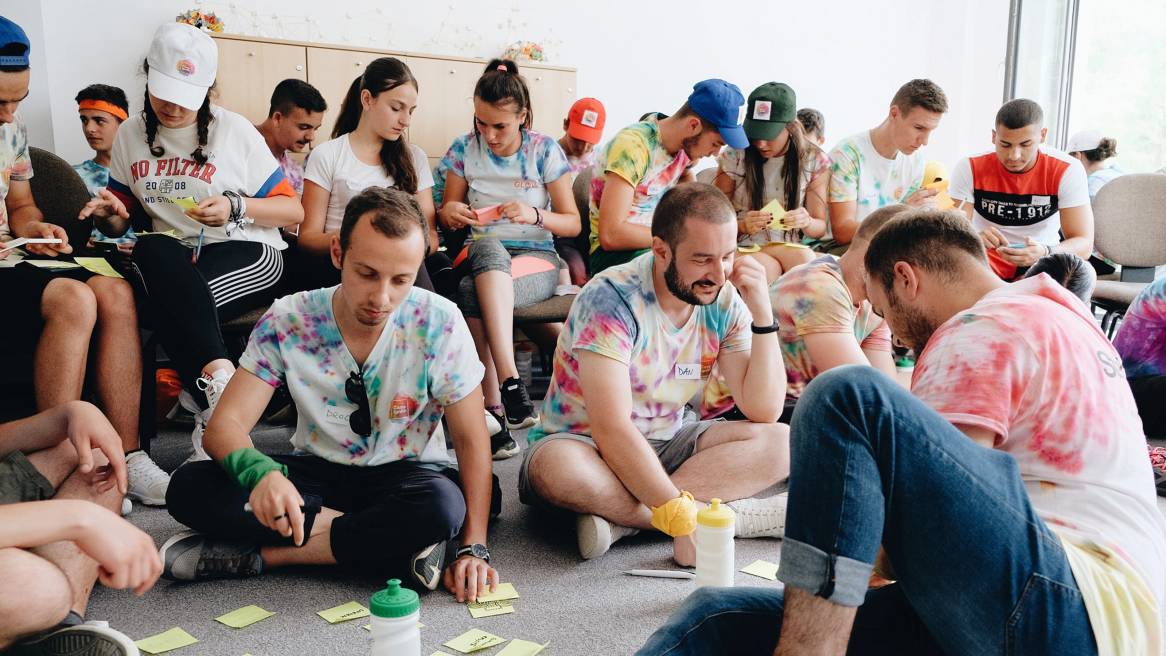Camp Ignite Sparks Equitable Opportunities
Steelcase partners on empowering youth in rural areas of Romania.
Alexandra Moldovan, project manager at Steelcase, has a genuine, friendly smile. “I had a dream. When I was younger, I participated in a camp for teenagers organized by the Peace Corps. It changed my life. I have always hoped I could help other young people go through the same experience and ignite in them the spark that is in all of us.”
When Moldovan started to work for Steelcase at the company’s European Business Center in Cluj five years ago, the project began to take form, endorsed by the Steelcase Social Impact team. Kim Dabbs, Global Director of Social Innovation, confirms: “Everything we do, everything we design as a company has an impact on the world, and making sure we have holistic policies, practices and partners both inside and outside of Steelcase is key and critical to how we deliver. We’ve focused on partnerships aligned with quality education and reducing inequality. We’re trying to bring positive change to the people we’re working with as well as to our planet.”
Alina Foghis, Fundraising & Marketing coordinator at World Vision, continues: “Alexandra came to me in 2015 and proposed to organize a camp in collaboration with Steelcase. I like challenges, and I believed in her idea, so I said, ‘Yes, let’s do it.’ That was the beginning of a beautiful friendship and an impactful project called Camp Ignite.”
World Vision carries out long-term community projects in under-resourced, rural communities, focusing on education and reducing school dropout rates. According to The European Commission, the school dropout rate in Romania in 2018 reached 16.4% among teenagers aged 14 to 18 years of age; that’s five percent higher than the European Union average, explains Foghis. The numbers are even more dramatic in rural areas, where the school dropout rate is over 26%, and predominantly female. “Our programs facilitate children’s access to quality education, extracurricular activities, career opportunities and improving their families’ living conditions,” says Foghis. Steelcase has been financially supporting World Vision projects for several years. Today, the relationship has evolved into a real partnership and Camp Ignite celebrates its 9th edition.

“Camp Ignite focuses on developing leadership and critical thinking skills and promotes gender equity, diversity and inclusion,” explains Moldovan. The five-day camp allows teenagers to experience a journey of self-discovery and empowerment. Steelcase employees are responsible for designing and facilitating each camp session, which takes place twice a year and hosts 30 teens chosen from World Vision projects. The project has helped the company retain some of its best talent — they currently have a 90% retention rate. The camp has hosted over 270 teens to date.
Kinga Pakucs, a Steelcase facilitator responsible for the roll-out of the camps, says: “I started working as a facilitator at Camp Ignite five years ago, when the project started. I had participated in the camp myself as a teenager, similar to Alexandra. Once I had the chance to reconnect with the camp, I promised myself I would not let it go again. It helps me grow every year. It ignites not only the participants but all of us.” Kim Dabbs confirms: “So often our employees will come up to me and give me a big hug and say, ‘This is why I work at Steelcase, because we are able to do things like this.’ I always find that so amazing. Not only are we taking innovative and co-created approaches to how social impact happens, but we’re giving our employees the freedom and flexibility to understand what that looks like at the local level.”
Senior Designer Nicolae-Andrei Droc talks about his experience in The Camp and adds: “As facilitators, we don’t have answers, but rather ask questions and create a safe space to begin a conversation.”
“The camp is a collection of voices that all equally matter,” says Pakucs. “We practice empathy, foster adaptability and support diversity and divergent thinking.” Dragos, one of the participants, confirms: “The best thing about this camp is that you can be 100% honest.”
“The camp is a collection of voices that all equally matter.”
Kinga PakucsSteelcase Facilitator, Camp Ignite
Foghis explains why this is so important: “According to World Vision, gender roles are much stronger in rural areas: Mothers take care of their children, and usually don’t have a job. Fathers provide financial support. Differences in gender, race or inclination are rarely welcome. Bullying or domestic violence happens quite often. Breaking those stereotypes and having girls believing they can play football is basic, but still not easily accepted, similar to having boys feel comfortable crying.”
Adela, who attended in 2016, confirms the impact Camp Ignite had on her: “I come from Baciu village in Cluj county. Looking back, I think this experience changed the way I look at the world. Today, I focus on my studies at the Faculty of Letters in Cluj-Napoca, specializing in English-German language and literature; and I am not afraid to stand up for what I want, even if it doesn’t fit some of the traditional ways in which society sees women’s roles in Romania.”
Due to COVID restrictions, the 2020 edition took place entirely remotely; all participants were equipped with tablets and a stable internet connection. “It took quite a while to get everything organized,” Pakucs smiles. “It was not easy to get everyone connected, but we found a way. And after the camp, the teens can keep the equipment.”
“A voice in my head was telling me: ‘You can do it. You can be the change.’”
AnastasiaCamp Ignite Attendee
Anastasia, an attendee this year, was initially suspicious of the remote experience but soon changed her mind: “When I first heard that the camp would be online, I thought it would be somewhat of a rigorous course in which people would present different topics to us. The reality couldn’t have been more different — it WAS a camp! I could barely sense the age difference between the facilitators and me. There were no hierarchies. We all listened to one another. Everyone’s stories and experiences were valued. When the camp ended, I felt like I could move mountains. A voice in my head was telling me: ‘You can do it. You can be the change.'”
The impact of the camps has been significant. “At a micro level, the camp helps teens change the way they look at themselves, and in this way helps them break usual life-patterns and see alternatives. At a macro level, it impacts communities and contributes to systemic change in our society,” explains Pakucs.
The relationships continue after camp has ended. Participants remain in contact via the Alumni Community, a virtual “fireplace” to keep their spark alive. Some of them, like Dragos, can choose to become facilitators themselves. Others have started projects in their own communities.
“The camp helped me to see a new norm,” concludes Droc. “A norm where the standard to help each other and different points of view are welcome. A world where families, cities and societies are truly inclusive.”



